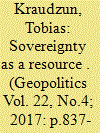| Srl | Item |
| 1 |
ID:
135865


|
|
|
|
|
| Summary/Abstract |
This paper deals with the strategies of households living in a peripheral high-mountain region in order to cope with the post-Soviet energy crisis. The Soviet modernization project failed at connecting the region to the grid, and imported coal for heating and fuel for producing electric energy at high costs over long distances. After the collapse of this alimentation system, people have substituted energy demands with wood and shrubs, and used increasingly available low-cost Chinese solar equipment to produce electrical energy. International development actors have failed to increase acceptance for energy efficiency technologies. Despite the Pamirs' high potential for solar and wind energy and decreasing installation costs, Soviet-style state planning of energy infrastructure still favours big hydropower stations, despite their high (social) costs and the limited potential on the Pamir plateau. The paper will discuss bottom-up effects of household decisions and top-down strategies as potentials and obstacles for a sustainable energy supply in the Pamirs.
|
|
|
|
|
|
|
|
|
|
|
|
|
|
|
|
| 2 |
ID:
116075


|
|
|
|
|
| Publication |
2012.
|
| Summary/Abstract |
This paper examines persistence and change in the Soviet Union's and then Russia's relations with Afghanistan with respect to development and security. First, a detailed analysis of the promise and reality of Soviet development assistance reveals conceptual shortcomings in their attempt to induce economic development in Afghanistan. The Soviet Union's heritage is then revealed in order to understand Russia's current perception of post-Taliban Afghanistan as well as Russia's emerging interests and commitment to Afghanistan's economic development. This paper argues that Russia will most likely replicate standard industrialization development approaches in contributing to Afghanistan's development. Therefore, Russia will probably run into problems similar to those that led to the failure of the Soviet modernization project, which consisted of large-scale development projects that were inappropriate to the country's institutions and the lives of most Afghans. It is questionable whether such reiteration will induce economic development now, in the complex setting of a fragmented and fragile state with a multitude of external players looking out for their own interests.
|
|
|
|
|
|
|
|
|
|
|
|
|
|
|
|
| 3 |
ID:
156828


|
|
|
|
|
| Summary/Abstract |
This paper scrutinises the translation of sovereignty into daily actions at the border. The Soviet Union established a heavily securitised and sealed border, which was perpetuated in post-Soviet, civil war-stricken Tajikistan by assigning the task to the Russian Federation’s border forces. After having taken over the task of guarding the border, the slowly recovering post-conflict state tried hard to maintain its own border control. Drawing on interviews with borderland people, this article discusses the convergence of Tajikistan’s strong claim but weak support for sovereignty, with the daily life of the borderland people. It will show how – given the Pamirs’ special status as a border district – far-reaching sovereign authority of state agents, aiming to provide security at the border, has been translated into arbitrary actions ensuring individual benefits and has been hidden by intransparency. The article argues that the lack of adequate support from the central government encourages state representatives at the border to reinterpret the sovereign power assigned to them in order to serve their own individual benefits and purposes. Instead of being used to maintain the state territory, the sovereignty’s power is diverted to serve individual interests, in the end serving to destabilize the border, the opposite of the intended purpose.
|
|
|
|
|
|
|
|
|
|
|
|
|
|
|
|